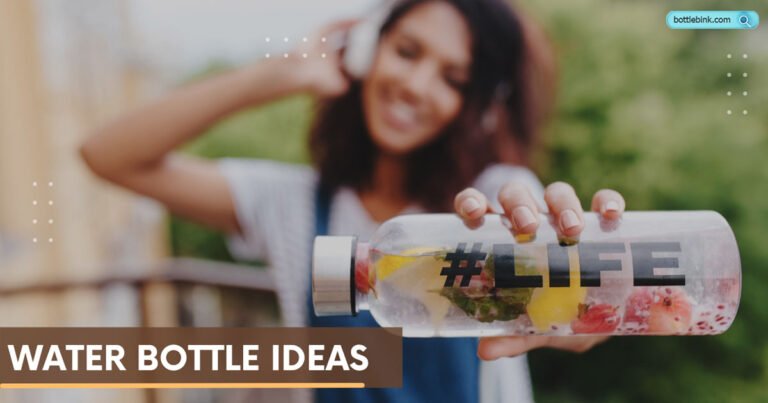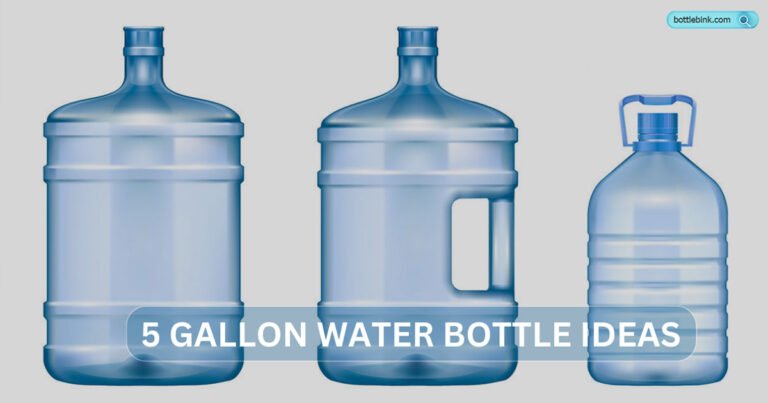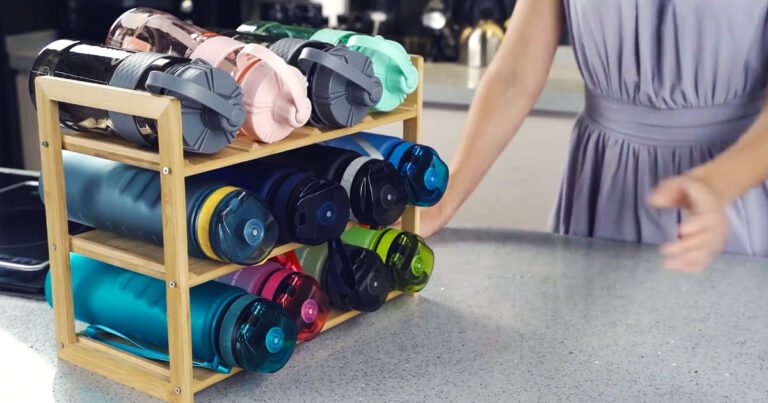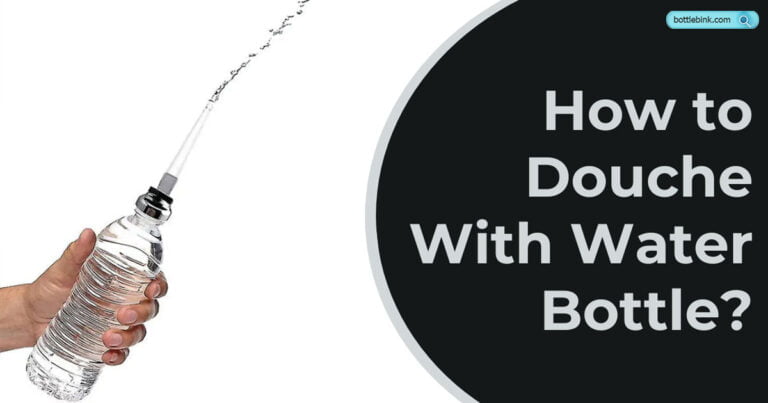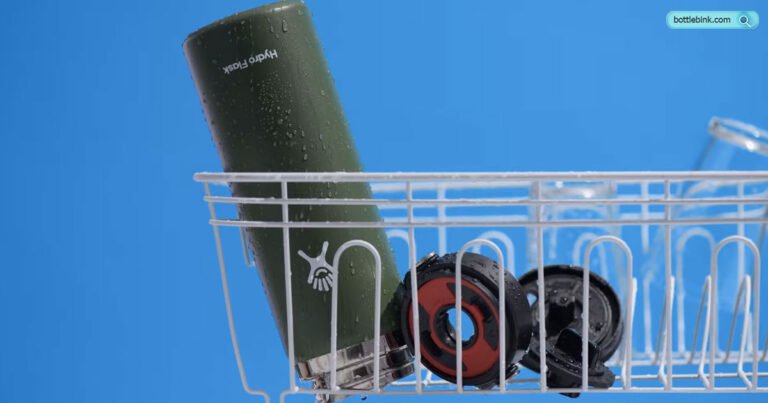Are Glass Water Bottles Healthier Than Plastic? Unveiling the Truth
Glass water bottles are generally healthier than plastic due to their non-toxic nature. They do not leach chemicals, unlike some plastics which can contain harmful substances.
Choosing the right water bottle is essential for both your health and the environment. Opting for glass over plastic has distinct advantages. Glass is made from natural materials and is chemical-free, ensuring that no harmful substances contaminate your water. Unlike plastics that might contain BPA or other chemicals, glass remains stable and doesn’t degrade over time, which means it won’t release anything into your drink even with repeated use or when exposed to high temperatures.
Additionally, glass bottles are easier to clean, reducing the risk of bacteria build-up. They are also more sustainable, as glass can be endlessly recycled without loss of purity or quality. Consider the switch to a glass water bottle for a safer hydration option and a step towards a healthier planet.
Glass Vs. Plastic Water Bottles: The Health Debate
Choosing between glass and plastic water bottles involves more than just aesthetic preference. The health implications behind the material can influence your well-being. Let’s dive into the health debate comparing glass and plastic water bottles.
Chemical Leaching Concerns In Plastic Bottles
Plastic bottles can harbor chemicals that pose health risks. Bisphenol A (BPA) is a common concern.
- BPA can leach into the water, especially when bottles get hot.
- This substance is linked to health issues like hormonal disruption.
- Some plastics contain other harmful chemicals that may leach over time.
- Plastic degradation further increases leaching risks.
Manufacturers often label bottles as “BPA-free.” But BPA-free doesn’t mean chemical-free. Many contain BPS or BPF, similar to BPA.
Advantages Glass Bottles Hold For Your Health
Glass bottles offer clear benefits for your health.
| Inert Material | Easier to Clean | Sustainability |
| Glass doesn’t leach chemicals into your water. | Dishwasher-safe, glass can endure high temperatures for sterility. | Reusable and recyclable, glass is a greener choice for the planet. |
Glass is non-porous and doesn’t absorb tastes or odors.
Choosing glass can mean a purer taste and a healthier you.
Environmental Impacts And Sustainability
Choosing between glass and plastic water bottles isn’t just about health. It’s about our planet too. Let’s dive into how these materials stack up in the long run.
Lifecycle Analysis: Glass Vs. Plastic
A lifecycle analysis helps us understand the full impact of a product. That includes the energy to make it, use it, and dispose of it. Here’s a comparison:
- Glass bottles require more energy upfront but last longer.
- Plastic bottles, on the other hand, use less energy to create but often end up in the landfill.
Reuse and recycle are key. A glass bottle can be used many times. It reduces the need to keep making new ones. This saves energy and resources.
Plastic bottles can be lighter to transport. This means they can have a smaller carbon footprint during distribution. But their end-of-life is a big concern for the environment.
Recycling Efficiencies And Waste Management
Let’s talk about getting rid of bottles. How easy is it to recycle glass and plastic?
- Glass recycling is efficient. It can be melted and made into new products again and again.
- Plastic recycling can be trickier. Not all plastics are recycled the same way. Some end up not being recycled at all.
In terms of waste management, glass is less likely to harm wildlife. Plastic can break down into microplastics. These tiny pieces can hurt animals and pollute our waters.
| Material | Recycling Rate | Waste Management |
| Glass | Highly recyclable | Harmless to wildlife if littered |
| Plastic | Varies widely | Can create harmful microplastics |
In summary, from an environmental standpoint, glass bottles often have the edge. To truly help our planet, picking products wisely and committing to proper recycle habits matter.
Taste And Purity Of Water
Choosing the right water bottle is about more than just convenience. It’s about ensuring that every sip of water is both refreshing and pure. The vast majority of people opt for either glass or plastic water bottles, but the impact on the taste and purity of the water can be significant.
Influence On Water Taste: Glass Vs. Plastic
What you drink your water from can affect its taste. Glass bottles are often revered for maintaining the purity of water taste. They are non-porous and chemical-free, meaning they don’t impart any flavors into the water. This is unlike plastic bottles, which can sometimes leave a noticeable taste or odor, especially if they are reused over time.
- Glass doesn’t absorb flavors – Keeps water tasting clean.
- Plastic can leach chemicals – Might change water taste over time.
- Plastic bottles – More susceptible to holding onto flavors from previous beverages.
The Role Of Bottle Materials On Water Contamination
The material of your water bottle could also play a part in how clean and safe your water is. Glass is often seen as the superior choice for purity. It’s impermeable to chemicals and doesn’t break down over time. Plastic, on the other hand, can break down, especially when exposed to heat or sunlight. This can lead to chemicals like BPA and phthalates leaching into the water.
| Material Impact on Water Quality | ||
| Material | Chemical Leaching | Duration for Safety |
| Glass | No leaching | Long-term use |
| Plastic | Possible leaching | Varies with exposure |
Considering both the taste and purity of your water is essential when selecting a bottle. Research supports glass as the health-forward choice. For the purest drinking experience, a glass water bottle is likely the best option.
Durability And Longevity Comparisons
Choosing between glass and plastic for your water bottle often comes down to how long they last. Each material’s lifespan and toughness matter. After all, a durable bottle is not just a good investment but also kinder to the planet. Let’s dive in and compare.
Surviving Drops And Dents: Material Resilience
Glass bottles shine in purity and integrity. They don’t degrade over time. But, they can break if dropped. A protective sleeve may help. Plastic bottles resist drops better, yet they can dent and warp. Over time, small cracks may form. These cracks can harbor bacteria.
Here’s a quick durability rundown:
- Glass: Can shatter on impact, but more resistant to wear and tear.
- Plastic: Tough against drops, prone to scratches and discoloration.
Assessing The Long-term Use And Cost-effectiveness
Think long-term value. Glass bottles may cost more upfront, but their longevity often wins out. Plastic bottles might seem economical. Yet, they often need replacing sooner. This makes glass cost-effective over the years.
| Material | Initial Cost | Average Lifespan | Long-Term Cost |
| Glass | Higher | Years with care | Lower, over time |
| Plastic | Lower | Months to a year | Higher, due to replacements |
Remember, choosing glass or plastic isn’t just about money. It’s about health, the environment, and long-term value.
Consumer Choices And Market Trends
Choosing between glass and plastic water bottles significantly impacts health and the environment. Consumer preferences shape market trends, reflecting growing awareness and demand for healthier options. Let’s dive into how public opinions are influencing the reusable water bottle industry.
Public Perceptions And Preferences
Consumers express a strong preference for water bottles made from safe, non-toxic materials. Glass bottles are seen as a healthier choice over plastic due to their chemical-free composition. Here are key reasons for their popularity:
- Non-reactive nature: Glass does not leach chemicals into water, unlike some plastics.
- Taste preservation: Water in glass bottles often tastes better, as it remains untainted.
- Recyclability: Glass offers eco-friendly disposal options due to its infinite recyclability.
Emerging Trends In Reusable Water Bottle Consumption
The market for reusable water bottles is evolving rapidly. Innovative designs and sustainable materials are at the forefront of this shift. Key emerging trends include:
- Eco-friendly materials: There is a growing demand for bottles made from sustainable resources.
- Smart bottles: Technology-integrated bottles that track intake are on the rise.
- Customization: Personalized bottles are becoming more popular, offering unique designs and features.
The table below summarizes the distinct advantages of glass water bottles over plastic:
| Aspect | Glass | Plastic |
| Health Impact | No chemical leaching | Potential chemical exposure |
| Environmental Footprint | Environmentally friendly | Often not biodegradable |
| Taste Quality | Preserves flavor | Can alter taste |
FAQs Of Are Glass Water Bottles Healthier Than Plastic
Why Choose Glass Bottles Over Plastic?
Glass water bottles are typically safer as they don’t contain chemicals like BPA found in some plastics. They are also better for taste and can be reused extensively, reducing environmental impact.
Do Glass Bottles Improve Water Quality?
Using glass water bottles can maintain the purity of water, ensuring no plastic-related chemicals leach into the liquid. This ensures the water tastes better and remains free from potential contaminants.
How Durable Are Glass Water Bottles?
Glass water bottles are designed with reinforced, often borosilicate glass, making them durable. However, they can still shatter upon impact, so they require careful handling.
Can Glass Bottles Reduce Health Risks?
Glass bottles can minimize health risks as they are free from harmful chemicals like BPA and phthalates, which can leach from some plastic bottles, especially when heated.
Conclusion
Glass water bottles offer a healthier hydration option over their plastic counterparts. They sidestep chemical leaching and preserve taste with elegance. Embracing glass means choosing sustainability for our planet. Make the switch, celebrate purity, and invest in your well-being—one sip at a time.

